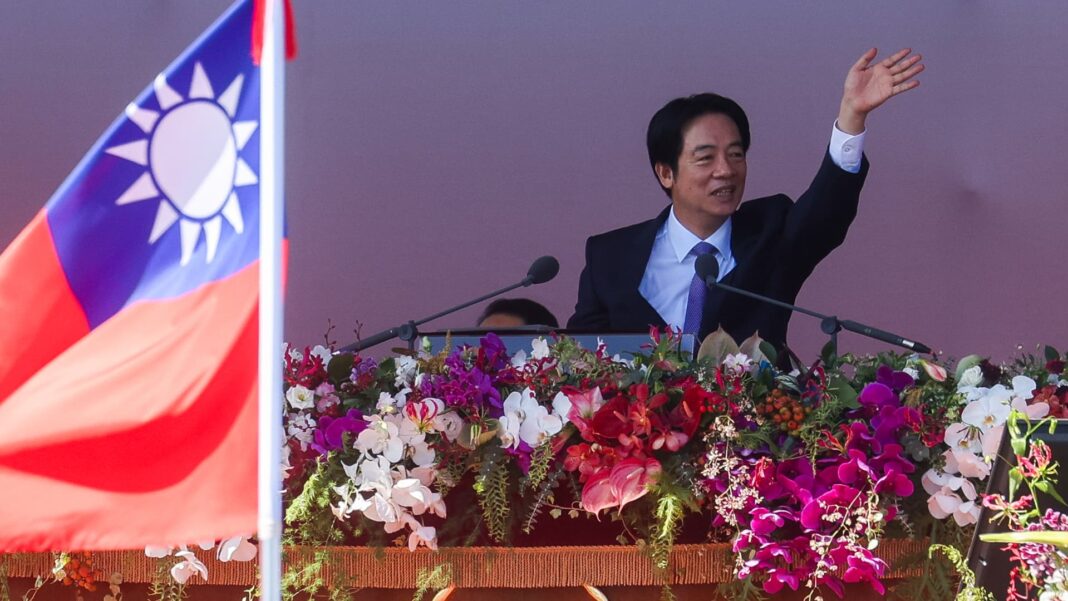TAIPEI, TAIWAN – OCTOBER 10: Taiwan President Lai Ching-te (William Lai) delivers a national day address, during the National Day Ceremony, outside the Presidential Office in Taipei, Taiwan, on October 10, 2025.
Daniel Ceng | Anadolu | Getty Images
Taiwan will introduce a supplementary defense budget of 1.25 trillion Taiwanese dollars ($40 billion) as Beijing accelerates military preparations near the island, President Lai Ching-te said at a press briefing Wednesday.
China has continued to increase military drills and so-called “gray-zone harassment” around Taiwan, with the goal of seizing the island by force by 2027, Lai said, according to a CNBC translation of his remarks in Mandarin. The speech comes in the aftermath of a diplomatic dispute between China and Japan over Taiwan.
Lai added that Beijing had intensified its “infiltration and influence campaign,” using a range of tools to interfere in Taiwan’s politics and society as it seeks to sway public opinion and undermine the island’s democracy.
He also cautioned “unprecedented military buildup” by Beijing and “intensifying provocations in the Taiwan Strait, in the East and South China Seas, and across the Indo-Pacific.”
Beijing considers democratically governed Taiwan as its own territory and Chinese President Xi Jinping regards its reunification with the mainland “a historical inevitability.” Taiwan rejects those claims.
China has been piling pressure on Taipei and has conducted several military drills off the coast of the island over the past few years, issuing stern warnings over Taiwan’s “provocations for independence.”
Beijing raised its defense budget by 7.2% this year to about $245 billion, with its military assets heavily deployed near the Taiwan Strait, according to analysts at the Center for Strategic and International Studies.
Lai on Wednesday vowed to build up Taiwan’s self-defense capabilities in the face of growing threats from Beijing, aiming to achieve a high level of combat readiness by 2027.
“President Lai’s announcement is a signal to Washington of Taipei’s commitment to its self-defense and intent to increase imports to balance trade between the two,” said Drew Thompson, a senior fellow at the S. Rajaratnam School of International Studies in Singapore.
Since his election campaign, U.S. President Donald Trump has been pushing allies to increase defense spending. Trump even suggested Taiwan should pay to be protected.
Shortly after Lai’s speech, Raymond Greene, director of American Institute in Taiwan — the de facto U.S. embassy — said in a social media post that the United States “welcomes” the special defense budget and supports Taiwan’s “rapid acquisition of critical asymmetric capabilities needed to strengthen deterrence.
When asked to comment on Taiwan’s defense budget and Greene’s comments, a spokesperson for Chinese foreign ministry said at a daily press briefing Wednesday that “the Democratic Progressive Party’s plan of resisting reunification and seeking independence using armed forces is doomed to fail.” That’s according to a CNBC’s translation of the remarks in Mandarin.
China has been locked in a diplomatic spat with Japan over Taiwan, with Beijing accusing Tokyo of intervening in its internal affairs after Japanese Prime Minister Sanae Takaichi said earlier this month that the use of military force in any Taiwan conflict could be deemed a “survival-threatening situation” for Tokyo. Beijing called the remarks “egregious” and has demanded a retraction.
Trump spoke with Xi and Takaichi in separate phone calls on Monday. Experts say that Xi likely used the call to solicit Trump’s help in influencing Takaichi to tone down her rhetoric on cross-Strait issues.




